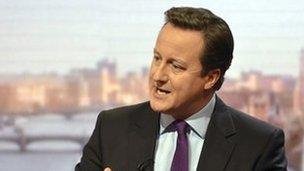David Cameron: Cheap borrowing the priority
- Published

Mr Cameron said the government was making progress on reducing the deficit
Prime Minister David Cameron has said reducing the UK's debt burden to ensure it can borrow money cheaply from international investors remains the government's top priority.
For this reason, he told BBC One's Andrew Marr Show, the UK's triple-A rating was "hugely important".
Mr Cameron said the coalition also needed to address youth unemployment, which was "much too high".
The economy needed rebalancing, with a larger private sector, he added.
The prime minister said it was vitally important the government maintained its "credibility for deficit reduction" so it could continue to borrow money at low rates of interest.
"Britain needs low interest rates, and we can only keep interest rates low if we have a credible policy on debt," Mr Cameron said.
'Negative outlook'
The coalition has introduced a series of austerity measures designed specifically to reduce the country's debt levels.
Despite these efforts, last month Standard & Poor's became the last of the three main international credit rating agencies - the other's being Moody's and Fitch - to put the UK on a "negative outlook". It raised concerns about levels of government borrowing and weak growth in the UK economy.
Critics argue that the government's spending cuts have undermined growth in the economy, which has been anaemic in recent years.
The economy emerged from a double-dip recession between August and October last year with strong growth of 0.9%, but a number of economists fear it could have contracted again in the final quarter.
The UK currently holds a AAA rating from all three agencies - the only country apart from Germany and Canada to do so.
There are concerns that if the UK loses its top rating, international lenders would view the country's economy as more risky and charge the government more to borrow money.
'Good signs'
Mr Cameron also said that although there were more people in work now than when the coalition came to power, youth unemployment in particular needed to fall.
He said cuts in the public sector were unavoidable given the need to reduce government debt, and argued the private sector needed to grow to compensate.
He said there were "good signs [that this rebalancing] was taking place", adding that it was important the economy became less reliant on the financial sector.
The unemployment rate in the UK currently stands at 7.8%, after August to September saw the biggest quarterly fall in the number of people out of work since 2001.
As the government approaches its mid-term review, director general of the business group CBI scored the coalition eight out of 10 for its plan for the economy, but just five out of 10 for delivery of the plan.
"Frankly, the government's delivery has been disappointing, if not sluggish," John Cridland told BBC Radio 4's World this Weekend programme.
"They are not getting on with house building, road building, rail building at the pace we would like."